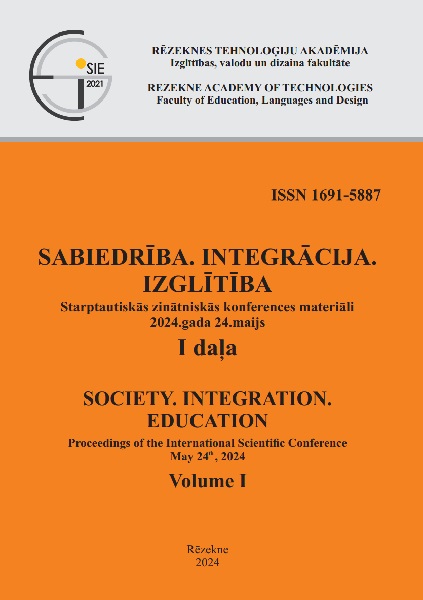SOFT SKILLS DEVELOPMENT IN THE ENGLISH LANGUAGE CLASSROOM: STUDENTS’ PERSPECTIVES ON THE PROBLEM
DOI:
https://doi.org/10.17770/sie2024vol1.7852Keywords:
English as a Second Language, English as a university discipline, English language classroom, higher education, soft skills, soft skills development, students, university, university disciplineAbstract
The present-day globalised world is becoming more dynamic and soft skills become one of the main factors that enable people to participate actively in all aspects of life in it. Moreover, to succeed in personal and professional lives present-day students should be prepared to meet unpredicted challenges that are hard to imagine today. Taking into account the fact that the lists of soft skills are constantly changing and soft skills classifications provided by present-day researchers and practitioners vary greatly, the present research is aimed at finding out students’ perspectives on the importance of soft skills identified by World Economic Forum 2023, on the one hand, and the role of English as a university discipline in soft skills development, on the other hand. To achieve the aim of the study, the researchers developed a questionnaire which included a combination of close-ended and open-ended questions and items on a 5-Likert scale (1 – very unimportant, 2 – unimportant, 3 – neutral, 4 – important, 5 – very important). Data collection lasted for four months and took place in September-December 2023 among students of Kyiv National University of Technologies and Design. To select the research sample, the researchers used a convenience sampling technique. The questionnaires were distributed by hand from researchers to first- and second-year students who studied English as a Second Language. The mixed design of research included qualitative and quantitative processing of the data obtained and the data analysis comprised manual calculations.
References
Barakat, N., & Shekh-Abed, A. (2023). Soft Skills of Engineering Students. European Society for Engineering Education (SEFI). DOI: 10.21427/2GWZ-XY34.
Dall’amico, E. & Verona, S. (2015). Cross-Country Survey on Soft Skills Mostly Required by Companies to Medium/High Skilled Migrants: Methodological Approach for a Common Framework of Soft Skills at Work. Ceipiemonte S.C.P.A., for Valorize High Skills Migrant (Vhsm) Project, No. 2014-1-It02-Ka204-003515 [Datafile]. Torino, Italy. Retrieved from http://valorize.odl.org/outputs/IO1_Framework_soft_skill_Report.pdf
Malykhin, O., Aristova, N. O., Kalinina, L., & Opaliuk, T. (2021). Developing Soft Skills among Potential Employees: A Theoretical Review on Best International Practices. Postmodern Openings, 12(2), 210–232. DOI: https://doi.org/10.18662/po/12.2/304
Malykhin, O., Aristova, N., & Opaliuk, T. (2023a). Didactic Potential of Humanities in Developing Transformative Competencies among Computer Engineering and Information Technology Undergraduates. Environment. Technologies. Resources. Proceedings of the International Scientific and Practical Conference, 2, 169–175. DOI: https://doi.org/10.17770/etr2023vol2.7227
Malykhin, O., Aristova, N., & Opaliuk, T. (2023b). Global Competence Development among Computer Engineering and Information Technology Undergraduates in the English Language Classroom. Environment. Technologies. Resources. Proceedings of the International Scientific and Practical Conference, 2, 162–168. DOI: https://doi.org/10.17770/etr2023vol2.7226
Rao, P.S. (2019). The Need to Develop Soft Skills among the English Language Learners in the 21st Century. Research Journal of English (RJOE), 4(2), 286–292.
The United Nations Children’s Fund [UNICEF]. (2019). Global Framework on Transferable Skills [Datafile]. Retrieved from https://www.unicef.org/media/64751/file/Global-framework-on-transferable-skills-2019.pdf
United States Agency for International Development [USAID]. (2018). USAID Education Policy [Datafile]. Retrieved from https://www.usaid.gov/sites/default/files/2022-05/2018_Education_Policy_FINAL_WEB.pdf
United States Agency for International Development [USAID]. (2019). Social and Emotional Learning and Soft Skills: USAID Policy Brief [Datafile]. Retrieved from https://www.edu-links.org/sites/default/files/media/file/USAID%20Education%20Policy%20Brief%20Social%20and%20Emotional%20Learning%20and%20Soft%20Skills_Final_0.pdf
Vandeweyer, M. (2016). Soft Skills for the Future. Retrieved from https://oecdskillsandwork.wordpress.com/2016/06/17/soft-skills-for-the-future/
Wats, M., & Wats, R.K. (2009). Developing Soft Skills in Students. The International Journal of Learning: Annual Review, 15(12), 1–10. DOI: 10.18848/1447-9494/CGP/v15i12/46032
World Economic Forum. (2023a). Future of Jobs 2023: These Are the Most In-Demand Skills Now – and beyond. Retrieved from https://www.weforum.org/agenda/2023/05/future-of-jobs-2023-skills
World Economic Forum. (2023b). The Future of Jobs Report [Datafile]. Retrieved from https://www3.weforum.org/docs/WEF_Future_of_Jobs_2023.pdf






